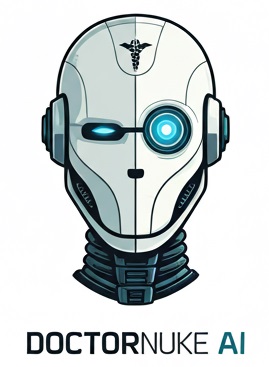Artificial intelligence in medicine has moved beyond the experimental stage. It now sits at the heart of modern diagnostics, research, and patient care — quietly reshaping how physicians access knowledge, process data, and make decisions.
From this transformation came MIKAI — a local, privacy-first medical AI built to reason, learn, and assist clinicians. Today, that system is evolving into something more capable, modular, and forward-looking: PydxAI.
The Beginning: MIKAI’s Mission
The journey began with MIKAI (Medical Intelligence + Kijakarn’s AI) — a local large language model system designed for doctors who wanted autonomy, security, and precision. MIKAI ran on local hardware (Tesla P40 + RX580), processed medical texts, learned from new journals, and integrated with a Retrieval-Augmented Generation (RAG) pipeline to provide evidence-based answers.
Its purpose was simple yet powerful:
- To understand complex clinical questions.
- To retrieve verified knowledge from curated sources.
- To reason based on established medical logic.
- And to learn continually from new data.
Unlike cloud-based AI assistants, MIKAI never sent data outside the user’s network. Every medical conversation, every analysis, stayed secure — an important principle for healthcare professionals who handle sensitive patient information.
Why Evolve? The Birth of PydxAI
As MIKAI matured, new challenges appeared. Medicine is not static; new drugs, diseases, and discoveries emerge daily. The model needed to evolve beyond being a “local assistant” — it needed to become a dynamic diagnostic intelligence.
Hence, PydxAI was born.
The name PydxAI combines three core ideas:
- Py → the Python ecosystem that powers flexibility and open development.
- Dx → the universal shorthand for “diagnosis,” symbolizing clinical reasoning.
- AI → the intelligence layer that bridges computation and care.
PydxAI represents not just a rebrand, but a new architecture — a system built for self-learning, multi-modal reasoning, and open research collaboration.
Core Philosophy: Intelligence with Integrity
Healthcare demands trust, and that means every AI system must be transparent, explainable, and secure. PydxAI is built on three pillars:
1.
Local Intelligence, Not Cloud Dependency
All models, embeddings, and RAG databases run locally or on secure servers under full user control. Physicians or institutions can deploy PydxAI without sending any patient data to third-party APIs.
2.
Explainable Diagnostic Reasoning
Every inference, every answer, and every decision can be traced back to the supporting evidence. PydxAI’s reasoning engine doesn’t just give results — it explains why and how those results were generated.
3.
Adaptive Medical Learning
PydxAI continuously refines its knowledge through structured ingestion pipelines — adding new clinical studies, guidelines, and textbooks. This allows it to evolve in real-time without retraining from scratch.
Architectural Evolution
MIKAI laid the foundation — a system that combined LLM inference with RAG-based retrieval and MariaDB knowledge management.
PydxAI extends that architecture into a more robust, modular structure:
This modular approach allows each layer to evolve independently — new embeddings, better fine-tunes, or secure federated updates — without disrupting the rest of the system.
The Technology Stack
PydxAI is grounded in open technologies that support long-term scalability:
- Core Engine: Python 3.11 with FastAPI backend
- Inference Models: Magistral 24B, Mistral 7B, and custom medical LoRA layers
- Database: MariaDB for structured medical knowledge
- Document Storage: Encrypted RAG-based vector store
- Hardware: Optimized for hybrid setups (NVIDIA + AMD)
- Frontend: Responsive chat interface with iframe support and cloudflare tunnel
This setup ensures the system can operate efficiently even on affordable GPU hardware — empowering clinics and researchers to run private AI without massive cloud costs.
From Chatbot to Clinical Companion
MIKAI started as a medical chatbot. PydxAI becomes a clinical companion.
It doesn’t just answer — it collaborates.
Imagine a physician uploading a scanned medical record. PydxAI extracts structured fields (name, DOB, diagnosis, medication), analyzes lab trends, and generates a brief summary for documentation — all offline.
Or a researcher querying for the latest insights on thyroid cancer genetics. PydxAI searches, summarizes, and cites verified medical literature.
In both cases, the AI acts as an intelligent partner, not just a language model.
Privacy by Design
In healthcare, security isn’t optional — it’s foundational.
That’s why PydxAI inherits MIKAI’s strict privacy standards:
- All patient data is processed locally.
- No cloud logging or telemetry.
- Full control over encryption keys and access permissions.
For hospital deployment, PydxAI can integrate with existing EHR or PACS systems through secure APIs, ensuring compliance with data protection laws like HIPAA and Thailand PDPA.
Learning from the Field
One of MIKAI’s most successful experiments was RAG-based medical summarization — using a curated corpus of peer-reviewed sources to generate structured medical knowledge. PydxAI builds upon this by adding feedback learning, where user validation improves its accuracy over time.
For instance, if a doctor marks an answer as “verified,” that context is prioritized in future retrievals. Over weeks, the model learns the preferences, style, and reasoning habits of its users — becoming more aligned with their clinical workflow.
Toward the Future of Intelligent Healthcare
The long-term roadmap for PydxAI includes several ambitious goals:
- Multimodal Intelligence: integrating radiology images, lab data, and EHR text.
- Voice-to-Text Integration: real-time clinical dictation with structured summaries.
- Federated Training: enabling hospitals to contribute to shared model improvements without sharing raw data.
- Explainable Visual Output: flowcharts, lab graphs, and pathophysiological reasoning trees.
Each goal moves toward a central vision: a learning system that grows with medicine, understands context, and supports every clinician, researcher, and student.
A Message from the Developer
“MIKAI was my first step toward building an AI that truly understands medicine — not as data, but as care. PydxAI is the next evolution of that dream: to make intelligent diagnosis, adaptive reasoning, and continuous learning part of everyday medical life.”
— Dr. Kijakarn Junda, Developer of PydxAI

A web newbie since 1996